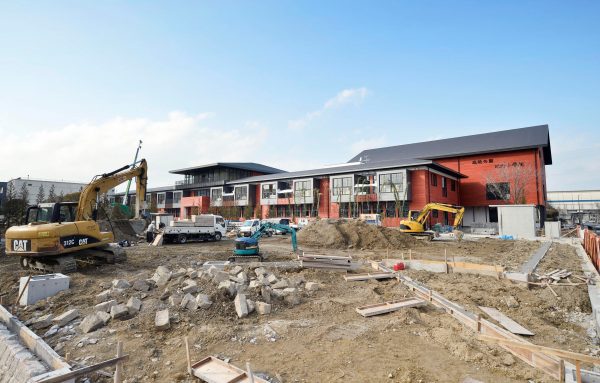has again reminded the Japanese public of the behind-the-scenes workings of nationalist lobby group Nippon Kaigi.
On 17 February Japanese newspapers reported that the headmaster of Tsukamoto kindergarten in Osaka, Yasunori Kagoike, had been distributing pamphlets to parents denigrating the ‘evil thoughts’ of resident Koreans and Chinese. Kagoike was eventually forced to apologise publicly for his remarks, claiming that while the constitution guaranteed the freedom of religion, this did not excuse his use of ‘vulgar expressions’. One of these ‘vulgar expressions’ was the term ‘shina-jin’ to refer to Chinese — a term harkening back to Japan’s colonial past and today considered derogatory by most Chinese and the Japanese public.
That Kagoike would use such language is hardly surprising. Tsukamoto kindergarten is famous in Japan for its daily readings of the Imperial Rescript on Education. The rescript, originally declared by the Meiji emperor in 1890 and read in all schools until 1945, establishes how a loyal imperial subject is to act in accordance with the emperor’s will. At the kindergarten the rescript is taught as a way for the children to connect to the traditional morals of Japan.
In April, Moritomo Gakuen is scheduled to open its first primary school in Osaka, with Kagoike acting as its headmaster. The school, Mizuho-no-kuni Memorial Primary School, takes its name from a classical name for Japan, ‘land of abundant rice’. It claims that it will be Japan’s first Shinto primary school, even housing a shrine on the school grounds. The school says the shrine will help emphasise the connection between the school and ‘the roots of our country’ — Shintoism.
Over the last couple of weeks, the school has been the centre of a scandal over its construction and apparent close links with prime minister Abe and his wife, Akie.
The property on which the school is being built was bought in 2016 for 134 million yen (US $1.18 million), a seventh of its estimated worth. When Moritomo Gakuen initially sought donations for the school, it was to be named the Abe Shinzo Memorial Primary School. Abe says he opposed this bid and demanded his name be removed, yet his wife remained honorary headmaster until February 2017. It was only after opposition politicians started questioning the procedures allowing the school’s cheap land purchase that the couple started to distance themselves formally from the project.
The school continued to be a source of personal distress for the prime minister after a video emerged in February showing children at Tsukamoto kindergarten cheering for Abe during a sports event, thanking him for passing security legislation. While Abe has since disowned this event, the fact that the children were encouraged to rehearse this particular message puts Abe and Kagoike in the same ideological bag. Although Abe has denied any involvement in the land sale, even calling for an investigation by the Board of Audit, he has acknowledged that he shares Kagoike’s basic ideological position.
Like Abe and an overwhelming majority of his current cabinet ministers, Kagoike is a member of Nippon Kaigi, a nationalist organisation dedicated to re-establishing Japan as a ‘proud nation’. This includes the establishment of a patrilineal line of emperors as the head of state, a strong military, and reform of the educational system to further emphasise Japanese values and traditions.
In many ways, Tsukamoto kindergarten can be seen as a model for how Nippon Kaigi envisions the future for all of Japan’s educational institutions. Besides teaching traditional morals based on the Imperial Rescript and traditional arts like kendo and shogi, the kindergarten also encourages children to idolise Japan’s Self-Defense Forces (SDF). The kindergarten’s homepage describes how children have been expressing ‘honour and gratitude’ to the Maritime SDF, handing out pennants wishing them ‘good luck with the pirate extermination’. The kindergarten even received a thank you note from current Minister of Defence Tomomi Inada, also a member of Nippon Kaigi.
Nippon Kaigi describe themselves as a ‘grassroots movement’ or a ‘movement for the people’, but it is doubtful whether the organisation enjoys much support among the general population. As Mizohata Sachie writes, the group ‘deliberately avoids discussing its agenda before each election’. Instead, the focus of incumbent Liberal Democratic Party (LDP) election campaigns tends to be on questions of economics, and of late, ‘Abenomics’. Politicians of the LDP’s nationalist Seiwakai faction are well aware that they cannot win elections based on utopian visions of Japan’s imperial past.
Over the past year, with the gradual exposure of Nippon Kaigi’s activities, the fact that a nationalist organisation has been working its influence more or less unseen and unopposed for two decades has increasingly angered the Japanese public. Whether Abe is shown to have been involved with the land sale scandal or not, the public has again been reminded of the close connections that exist between their prime minister and the extreme nationalist right that Moritomo Gakuen represents.
It remains to be seen how this latest evidence of Abe’s ties to the extreme right will play with the public.
Ernils Larsson is a PhD candidate in the History of Religions at the Faculty of Theology, Uppsala University.


As the author himself concludes ‘it remains to be seen how this latest evidence of Abe’s ties to the extreme right plays out with the public,’ I think it is premature to opine that the Japanese electorate are ‘increasingly angered’ by Nippon Kaigi’s influence over the last two decades. Are there any polls to suggest this increasing anger? Has/will the opposition parties gain in popularity because of this?
Up to now Abe and his cohorts have been able to keep this aspect of their ideology largely ‘under the radar,’ so to speak. We shall see if this continues to be the case.